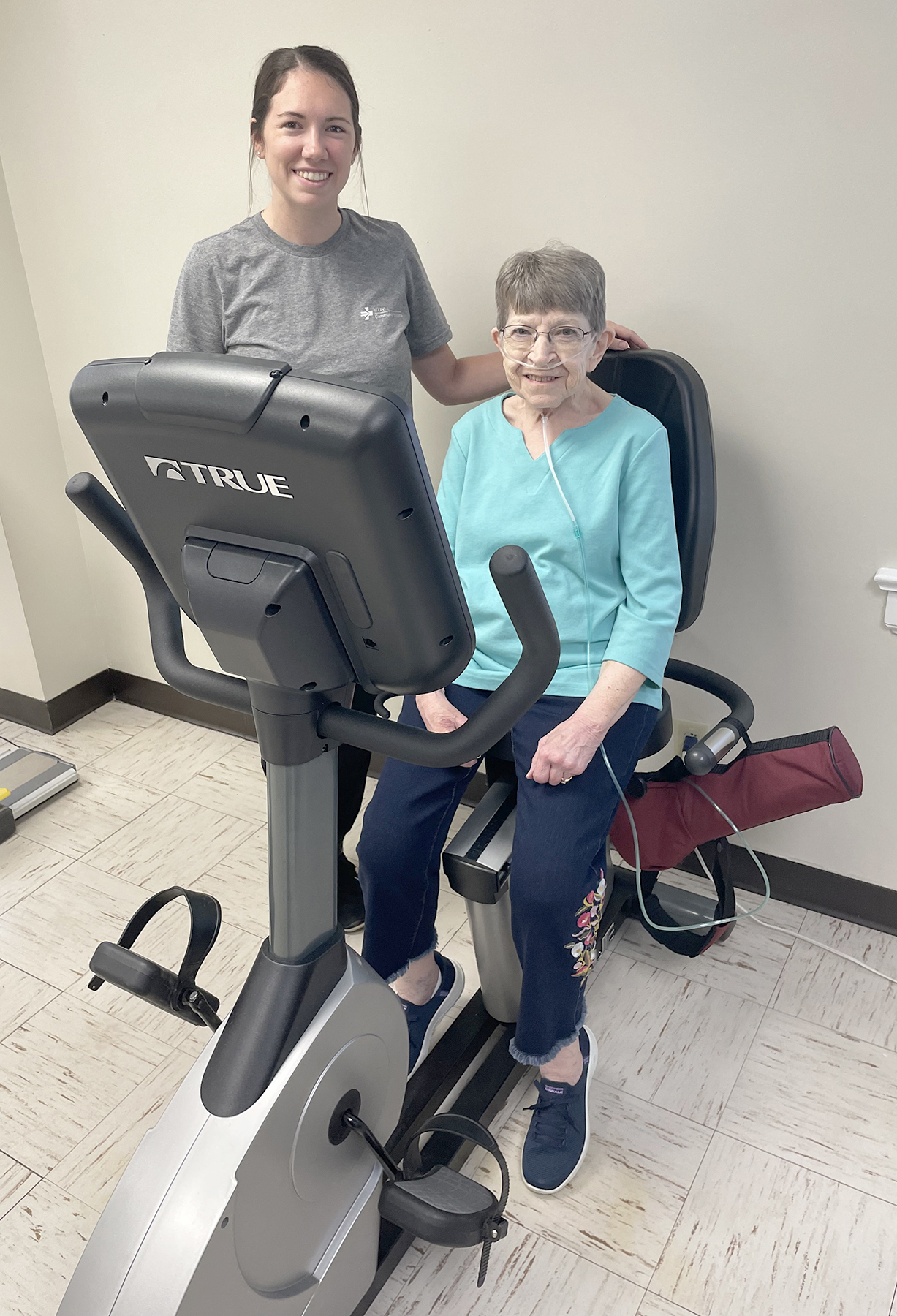If you have the opportunity to meet Illini Community Hospital nurse Ashley Holland, you may notice she wears a small, gold-plated pin in the shape of a human brain on her uniform. It is a badge of honor. Ashley, RN, BSN, TNS, Non-Invasive Cardiology, is the first Illini nurse to receive a Blessing Health System “Stroke Recognition Pin” for her role in saving the life of 78-year-old Linda Smith of Pittsfield.
What happened?
It was February 28, 2025 and Linda was preparing to head to her second Cardiac Rehabilitation program exercise appointment after having had heart valve replacement surgery.
“I was getting out of the shower and I started to reach for my towel, but I could not get ahold of it because I could not feel it.”
Linda’s hand was numb.
“I started to step out of the tub and I could not feel my right leg either.”
Linda sat down for a few minutes. The feeling returned to her hand and leg.
“So, I thought, ‘Okay. I am fine.’ I finished getting ready and came to the hospital for cardiac rehabilitation.”
Ashley helped Linda realize how “not fine” she was upon her arrival.
“I always ask my patients how they are feeling when they come in,” Ashley said. “Linda hesitated. I remember her saying, ‘What are the signs of a stroke?’’
Linda was wearing a mask as she recovered from heart valve surgery. Ashley removed the mask and saw that Linda’s face was drooping to one side – another telltale sign of a stroke, in addition to the arm and leg weakness Linda felt earlier.
“I told her, ‘We are not exercising today. You are going to the emergency room now,’” Ashley said.

Early recognition is key to stroke survival
Ashley knows stroke. She was an emergency room nurse for five years, including serving on the Blessing Hospital Emergency Center team – a nationally recognized Stroke Center - before joining the Illini Cardiac Rehabilitation department staff.
Ashley took Linda to the Illini Community Hospital Emergency Room, and she was right, Linda was having a stroke. From there Linda was transferred to the Blessing Hospital Emergency Center. She was treated for a small blood clot at the base of her brain, interrupting the blood flow.
Brain cells begin dying within minutes of a stroke starting, due to lack of oxygen. Dead brain cells don’t come back to life making stroke the leading cause of adult disability in America and the 5th leading cause of death.
Since Linda’s stroke was caught early, she was left with minor complications from her stroke. She returned to Cardiac Rehabilitation 14 days later and would complete the 36-session program and graduate. Linda continues to exercise on her own at the Illini Fitness facility in Pittsfield.
“Ashley is the main reason my stroke did not get any worse,” Linda stated. “I could not ask for a better nurse. She has been so good to me. I thank her for that, and my family thanks her for that, too.”
“Ashley's dedication to her patients is unmatched,” said Ashley Cawthon, BSN, RN, nurse manager, Outpatient Services at Illini. “In a moment where every second mattered, she acted with skill and heart; a true example of patient-centered care.”
Advice from the award-winning nurse and her patient
“Recognize the signs and symptoms of stroke,” Ashley implores. “You have a small window of opportunity to get help. Know what to look for and where to go - the closest emergency room.”
“And don’t drive yourself to the hospital like I did,” Linda adds with emphasis. “Call an ambulance as soon as you think you are having a stroke.”
Calling 9-1-1 is the quickest way to get medical help and save brain cells, and keep everyone else on the road a little safer at the same time.
You can recognize the signs and symptoms of stroke by knowing the meaning of the acronym, BE FAST. Go to blessinghealth.org/stroke to learn what BE FAST means and how it could save a life.
